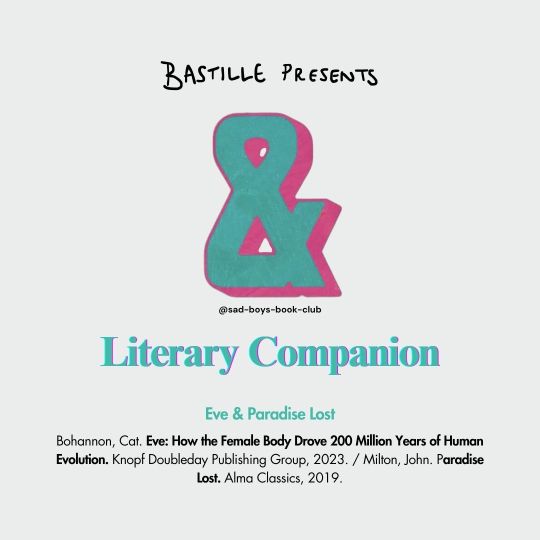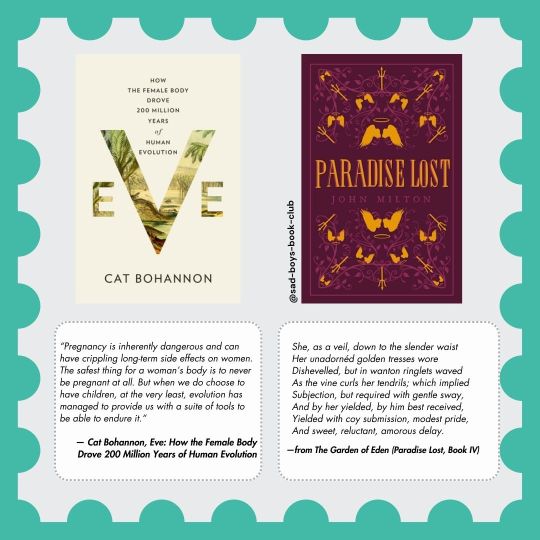#i have to apologize first. not for my unhealthy obsession for fictional pretty men.
Explore tagged Tumblr posts
Text

#i have to apologize first. not for my unhealthy obsession for fictional pretty men.#but because this popped into my brain and i started laughing really hard and continued to laugh the entire time i made the edit#sorry for going squidward mode <- he means laughing at his own jokes. hes not actually sorry#there is laughter inside of me and even if its my own stupid shit. i will perhaps giggol. hee he <- see?#im doing it again
11 notes
·
View notes
Text


"&" Ampersand - A Literary Companion: Eve & Paradise Lost
Hey everyone!
Let’s continue feeding my unhealthy obsession with Bastille by diving into the literary companion I created for “&”. Today, we’re talking about the second track: Eve & Paradise Lost. (Now that the album is out, I can finally follow the tracklist properly!)
In case you missed it, here’s my post about Intros & Narrators.
Before we jump into the book picks for this song, I want to apologize for the delay in writing this. I’ve had some family stuff going on, moved houses and also wanted to make sure I had read both books before recommending them.
Actually, I plan to take some time to go over the whole list of stories I’ve picked—I want to read them all thoroughly so I know exactly what I’m recommending to you all (some of them, I've already read, but I want to revisit them as well).
Now, let’s talk about the song. I find it fascinating to see a male songwriter like Dan taking on a woman’s perspective for a project that explores different stories. The official statement about the song stood out to me: “This song is about the burdens of loving women cruelly made to feel blame and shame from the dawn of time.” It’s clear Dan’s an artist who engages with feminist writings, and that’s something I truly appreciate—especially given how rare it is in the music industry, particularly for someone who presents as a straight, white male.
Cat Bohannon — Eve: How the Female Body Drove 200 Million Years of Human Evolution
The title character from the song. Probably the most cited figure from the Bible. A staple in paintings and literature for the past two thousand years. The first sinner. Eve remains a pillar of the Western collective imagination, her meaning changing a lot throughout the decades. From the representation of female sexual desire, scapegoating her for condemning the entire human race to death by eating the forbidden fruit (can you tell I went to Catholic school?), to being seen as the first example of female rage in the face of oppression. She embodies the complexities of womanhood—temptation, sin, and defiance—all wrapped into a single character.
Cat Bohannon’s book couldn’t be further from this. With a PhD from Columbia in the evolution of narrative, Bohannon explores why, in an age when we often see medical and science knowledge as some sort of truth, we still somehow have a very male-centric view of the human body.
By reexamining all the different potential Eves we have in the history of human evolution—that’s how she chooses to call all the ‘hypothetical female ancestors’ in our shared Homo sapiens lineage—, Bohannon urges us to reconsider and reshape our understanding of how our knowledge of the human body has often ignored half the world’s population.
As someone who enjoys reading non-fiction books (happy to share a few of my all-time favorites in the comments to whoever is interested), I found this book a really insightful, at times infuriating, eye-opening view into how sad it is that, for much of documented history, women have been seen as just men with breasts and wombs bolted on. The author is especially conscious of how sex (influenced by chromosomes, physiology, and hormones) and gender (how we identify, behave in our environment, and interact with one another) are not the same thing. She often adds notes to point out how science ignoring the female body and all its narratives has even worse consequences for trans and nonbinary folks, which I found really well-done and necessary in today’s age.
I picked this book as a companion to the song mainly because of the “rolled your eyes at pain you'll never comprehend” line, but I think it is a solid read on its own. I certainly learned a lot about my own body during the 15 hours I listened to the audiobook.
John Milton — Paradise Lost
So, Paradise Lost—the epic poem that pops up on pretty much every English Lit syllabus. Quick and snappy plot summary before we dive in: It’s a 12-part epic that covers Satan’s dramatic fall from Heaven, the creation of Adam and Eve, their blissful (but short-lived) days in Eden, the infamous temptation, and their ultimate eviction from paradise. Along the way, there’s a war in Heaven (didn’t exactly keep me on the edge of my seat), plus some deep philosophical chats between Raphael and Adam about creation, God, and, well, everything. It’s basically theological fanfiction (I mean it in the most neutral way possible).
Milton, being the good Puritan he was, used these stories to dig into free will, predestination, and conscience. It’s hard not to see Satan as a rebel leader and God as the authority figure, especially when you remember Milton was writing during the English Civil War.
The poem was widely known but highly controversial and criticized during Milton’s lifetime, however, during the Romantic period, poets like Shelley and Byron “reclaimed” Milton’s Satan as a tragic antihero figure.
Anyway, I had to dig out my old uni notes (and hit up some audiobooks) to brush up on Eve’s role in this whole mess. And let me tell you, there’s a lot to unpack. Mainly because: a) as is often the case with old poetry, there’s a lot to read between the lines; b) classics come with a million different interpretations, and c) there are a few different versions, depending on the edition you read, so it’s easy to get lost in the variations of text, footnotes, and commentaries. (And also d) I won’t lie, it’s a slow, heavy read. At times, I had to resort to the audiobook just to get through some of the passages!)
Here’s what stood out this time around: Eve’s role is seriously hard to pin down, as Milton's relation to gender politics has been scrutinized since, well, pretty much since it was published in the 17th century. (Yeah, I had to pull out good old Google Scholar, watch some lectures on YouTube, and, of course, dive into Muses: An Ampersand Podcast—thanks, Dan and, mostly, Emma.)
What I really enjoyed was reading some modern articles that analyze Eve’s character through the lens of feminism which ties into the song’s exploration of blame and shame—no Wild World pun intended.
First of all, when Eve is introduced to Adam in Paradise Lost, Milton has her momentarily distracted by her own reflection in a pool of water, a subtle but significant parallel to the myth of Narcissus (hint hint). It’s an early indication of how susceptible to being misled she will be later on. But it also plays into this idea that her curiosity and desire—whether for knowledge or just, you know, herself—are somehow “dangerous.”
Now, Eve gets the blame for the Fall because she’s tempted by Satan to snack on the forbidden fruit from the Tree of Knowledge. Sure, she’s tricked, but let’s not pretend it’s all the serpent’s fault—once the idea is planted, it’s Eve who talks herself (and Adam) into it. That shows some sense of agency on her part, right? She wasn’t just a passive, helpless victim; she wanted to prove herself, to be tested, and she took action.
Milton is giving her a bit of credit for having a mind of her own, even if it’s wrapped up in this narrative of downfall. Eve’s curiosity and independence—qualities we might admire today—become her so-called "fatal flaws" here. So, yes, the story punishes female agency, but it’s undeniably there. And in a world where women were (and still are) often written as powerless, it’s refreshing to see Eve at least take some control, even if the outcome is a bit... unfortunate.
Now, let’s be real, this whole negative portrayal of Eve isn’t shocking. Milton was writing in a time where misogyny was baked into pretty much everything (which, sadly, isn’t all that different from now). Eve’s agency and sexuality are framed as the ultimate cautionary tale: women’s sexuality and agency are seen as inherently dangerous and something that inevitably leads to moral fallings.
But despite it all, towards the later part of Paradise Lost, Eve does get a kind of redemption arc. I came across one scholar who referred to the concept of felix culpa, a phrase in Catholic tradition meaning "happy fault" or "blessed fall." Eve might be responsible for humanity’s downfall, but her actions also set the stage for the coming of Christ, making her "mistake" a necessary part of the larger divine plan. It’s a bit of a paradox—how can something so disastrous lead to something so positive?—but the idea is that certain misfortunes can eventually lead to greater good.
Milton leans into this in Book 12, where Adam says:
"O goodness infinite, Goodness immense! That all this good of evil shall produce, And evil turn to good; more wonderful Than that which creation first brought forth, Light out of Darkness!"
So, in a roundabout way, Eve’s fall isn’t all doom and gloom—she’s the necessary catalyst that sets God's plan into motion. In fact, scholars have started to reframe Eve’s role in Paradise Lost as something more empowering than it initially appears. Traditionally, Eve’s been seen as the ultimate cautionary tale, blamed for humanity’s fall and cast as a symbol of female weakness and danger. But if you look closely, there’s something subversive in the way she’s actually the mover of the entire plot.
Eve isn’t just sitting around passively following orders—she actively makes the decision to eat the fruit, which, yes, brings about the fall, but it’s also what triggers the eventual coming of Christ and the possibility of redemption. Without her action, we’d all be hanging out in Eden, stuck in a static, sheltered existence. In a way, this is Eve taking control of her fate, making a choice, even if it’s framed as "wrong."
Plus, while Milton definitely punishes Eve, her agency is undeniable. Adam is kind of an afterthought in the whole thing—Eve is the one who steps outside the box, embraces curiosity, and disrupts the status quo. To modern feminist readers, that kind of defiance (even if it’s punished) reflects the strength of a woman asserting her independence. Raphael even calls her "the mother of humankind," acknowledging her dual role. She is both chaos and creation—a symbol of disruption but also the source of life. So, in a way, Eve’s choice is what makes humanity... well, human.
I like how in the song, there’s also a sense of Eve having an agency and a mind of her own. The chorus highlights Eve’s struggle with the idea of being “made for” Adam—“When they say I was made for you... made from you”—and the frustration of biting her tongue, which relates to how her love for Adam intertwines with her need for independence.
That’s it for this post! I’ll be back soon with more book picks for the next track. Let me know if you’ve read these or if you have any thoughts!
Feel free to share your thoughts and any other book suggestions as well!
With love,
Cat
#mine#bastille#dan smith bastille#dan smith#dan bastille#ampersand#&#literature#paradise lost#eve#john milton
7 notes
·
View notes